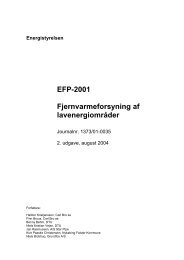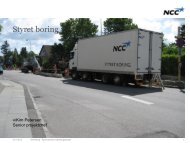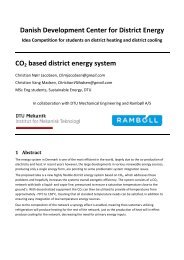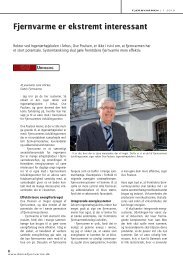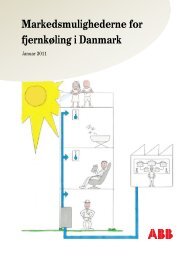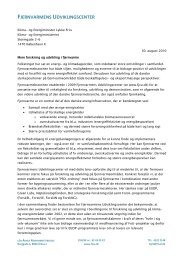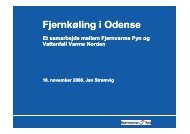producti<strong>on</strong> <strong>and</strong> provide for marginal profitability levelthat is not lower than the level defined by the Cabinetof Ministers <strong>on</strong> the base of calculati<strong>on</strong>s by the centralbody of executive power in heat supply.If heat tariffs do not cover the cost of heat <strong>and</strong> marginalprofitability level, the body that has set the tariff shouldprovide for the compensati<strong>on</strong> according to effectivelegislati<strong>on</strong>. That is, if the tariffs for heat from thermalpower stati<strong>on</strong> <strong>and</strong> boilers that are approved by the localgovernment <strong>on</strong> the basis of heat producer calculati<strong>on</strong>,<strong>and</strong> they are lower than ec<strong>on</strong>omically sound costincluding marginal profitability level, the localgovernments must compensate the losses from thelocal budgets.Meanwhile, the Ministry of Ec<strong>on</strong>omy elaborated thedraft that specifies binding of the household servicestariffs to energy prices. First of all, it means heat, hotwater <strong>and</strong> gas supply to households. The currentsystem of tariff setting reduces the competitiveness ofUkrainian industry, since industry is forced tocompensate for low households tariffs.The procedure to raise the heat tariffs is rathercomplicated <strong>and</strong> time c<strong>on</strong>suming, as follows:1) The district heat supply company receives officialnotificati<strong>on</strong> from NERC <strong>on</strong> gas price increase. Onlyafter that the company may start developing theproposal <strong>on</strong> the heat tariffs increase.2) The new heat tariffs have to be approved by thefollowing authorities: Commissi<strong>on</strong>s of the MunicipalCouncil (mis‘krada) <strong>and</strong> regi<strong>on</strong>al council (oblrada). Thetariff proposal has to be reviewed by several instancesas listed below:Trade uni<strong>on</strong>sAntim<strong>on</strong>opoly CommitteeDepartment for Price Administrati<strong>on</strong>Department for the Protecti<strong>on</strong> of C<strong>on</strong>sumer RightsPublic hearings3) Municipal Executive Committee (misk‘vyk<strong>on</strong>kom)has to approve the new heat tariffs as well.4) The tariff changes shall be publicized via officialmass media of Municipal or Regi<strong>on</strong>al Council. If duringa m<strong>on</strong>th there are no official protests from the Office ofPublic Prosecutor, the company is entitled to apply thenew tariffs.The above steps clearly show how cumbersome anytariff increase can be in practise.3.2. Market DriversArticle 54 of the state budget of Ukraine for 2006 <strong>and</strong>the Cabinet of Minister‘s Decree No.207 of 9 March,2006 stipulate for subsidies from the state budget tolocal budgets. No less than 75% of the subsidy must beThe <str<strong>on</strong>g>12th</str<strong>on</strong>g> <str<strong>on</strong>g>Internati<strong>on</strong>al</str<strong>on</strong>g> <str<strong>on</strong>g>Symposium</str<strong>on</strong>g> <strong>on</strong> <strong>District</strong> <strong>Heating</strong> <strong>and</strong> <strong>Cooling</strong>,September 5 th to September 7 th , 2010, Tallinn, Est<strong>on</strong>ia219directed to energy saving in heat, water supply <strong>and</strong>sewerage. But according to m<strong>on</strong>itoring results, thefunds are allocated to other purposes. Only fourregi<strong>on</strong>s used the funds for energy saving. Otherregi<strong>on</strong>s used from 7% to 40% instead of the required75% to energy saving.Other measures of energy saving that would beappropriate include:replacement or rec<strong>on</strong>structi<strong>on</strong> of steam <strong>and</strong> gasboilers with efficiency that is lower than 89%;improvement of heat pipes insulati<strong>on</strong> to decreaselosses in transmissi<strong>on</strong> pipelines;installati<strong>on</strong> of heat meters; <strong>and</strong>,Installati<strong>on</strong> of co-generati<strong>on</strong> equipment.Another stimulus for companies to introduce energysaving technologies is outlined in the Law of Ukraine―On Heat Supply‖. According to the Article 8, ―in caseheat supply or heat transportati<strong>on</strong> companies introduceenergy saving measures that result in saving of heatlosses, the body of executive power, that is entitled toregulate heat tariffs according to the Law, may leavethe tariffs unchanged for the three c<strong>on</strong>secutiveyears‖.[4]3.3. Main BarriersIn general, there are a number of decent laws <strong>and</strong>regulati<strong>on</strong>s that would support DHC development, butthey are not implemented properly, as menti<strong>on</strong>edabove already.Therefore, there is little if any incentives to businessoriented development of the heating services, but thesystems are run at minimum investments <strong>and</strong> reducedtechnical performance. The DH companies are solelyoperati<strong>on</strong> organizati<strong>on</strong>s, mainly departments of themunicipality. The municipalities take care of billing <strong>and</strong>collecting based <strong>on</strong> subsidized lump sum tariffs, <strong>and</strong> <strong>on</strong>investment decisi<strong>on</strong>s.There are many privileged customer categories thatenjoy reduced costs of DH services. In Odessa, forinstance, 25% of the customers in year 2006 enjoyedsuch privileged heating prices. Their billings weredecreased by 20, 30, 50, 75 or even 100%, whicheffectively destroys the business opportunities of DH.Individual <strong>and</strong> aut<strong>on</strong>omous heating in every apartmentseems the most favourable opti<strong>on</strong> for c<strong>on</strong>sumers. Insuch a case they do not pay for heat <strong>and</strong> hot water but<strong>on</strong>ly for gas <strong>and</strong> cold water. In additi<strong>on</strong>, they canregulate temperature in their apartments <strong>and</strong> do notsuffer from overheating in spring <strong>and</strong> insufficientheating in winter. But sometimes it is impossible toinstall aut<strong>on</strong>omous boilers in every apartment, becausethere is not enough space for heating equipment <strong>and</strong>the vertical ventilati<strong>on</strong> ducts are not designed for fluegases. Therefore, it would be appropriate to install <strong>on</strong>e
oiler for the whole building (several apartments) orseveral buildings. Another problem for individual <strong>and</strong>aut<strong>on</strong>omous heating is that in case of gas supplyinterrupti<strong>on</strong> there is no reserve fuel resources toc<strong>on</strong>tinue heating. Reserve fuel can be provided <strong>on</strong>ly forcentralized DH.Frequent failures in the heating systems as a result ofoutdated equipment <strong>and</strong> poor funding are still comm<strong>on</strong>throughout the country. Some service breaks in coldestwinter times have caused serious impacts <strong>on</strong> humanlife already.Legally, local authorities that establish tariffs forpopulati<strong>on</strong> lower than the cost coverage level have tocompensate the difference to energy‐generatingcompanies. In practice the compensati<strong>on</strong> is not alwayspaid in full which leads to arrears accumulati<strong>on</strong> <strong>and</strong>aggravates financial state of heat‐generators. Theprocedure of heat tariffs increase is rather complicated,as well as time c<strong>on</strong>suming.According to the Law of Ukraine adopted in April 2006,heat producers such as CHPs <strong>and</strong> renewable sourcespower plants are not allowed to cross‐subsidy heatproducti<strong>on</strong> to cover losses from heat producti<strong>on</strong> at thecost of electricity producti<strong>on</strong> or other activity.Nevertheless, official sources say that due to low heattariffs for CHPs heat producti<strong>on</strong> is subsidized by thecost of electricity producti<strong>on</strong>. But the unofficial sourcesassert that CHPs may charge heat tariffs that are evenhigher than heat producti<strong>on</strong> cost to cover losses fromelectricity producti<strong>on</strong>, because electricity tariffs are set<strong>on</strong>ly by NERC while heat tariffs are set by heatproducti<strong>on</strong> companies with the approval of local bodiesof power.3.4. Current ActivitiesThe DH strategy is under preparati<strong>on</strong> in Ukraine as amulti-ministerial approach <strong>and</strong> it should be ready in fall2010. CHP development is in the focus of the strategy.There has also been comprehensive frameworksupport initiated by USAID, EBRD <strong>and</strong> EU toreformulate the nati<strong>on</strong>al energy policy, including DHC<strong>and</strong> CHP. It is uncertain now how much the politicalelecti<strong>on</strong> of April 2010 will influence availability of suchforeign technical assistance in the years to come.4. U.S.A.4.1. Status of DHCThe total DHC industry base comprises approximately2 500 systems, in which the number of customerbuildings served by a typical DHC system may rangefrom as few as 3 or 4 in the early stages of new systemdevelopment to the largest system served byC<strong>on</strong>solidated Edis<strong>on</strong> in Manhattan. The downtownThe <str<strong>on</strong>g>12th</str<strong>on</strong>g> <str<strong>on</strong>g>Internati<strong>on</strong>al</str<strong>on</strong>g> <str<strong>on</strong>g>Symposium</str<strong>on</strong>g> <strong>on</strong> <strong>District</strong> <strong>Heating</strong> <strong>and</strong> <strong>Cooling</strong>,September 5 th to September 7 th , 2010, Tallinn, Est<strong>on</strong>ia220DHC/CHP system in New York City is the World‘slargest steam system with 1850+ customers.DHC (primarily DH currently) delivers about 3,5 % ofthe total final energy dem<strong>and</strong> in the industrial,residential, public, <strong>and</strong> commercial sectors. In the pasttwo decades, some 47 Mm 2 has been c<strong>on</strong>nected to theDHC systems, but the total customer base volumenumber is not available.The DHC systems are predominantly (80%) withsteam, the c<strong>on</strong>sumpti<strong>on</strong> being a mixture of steamheating, cooling <strong>and</strong> DHW depending <strong>on</strong> the particularcase. There is little residential heat load but themajority is public: offices, malls, universities <strong>and</strong>military bases.Countrywide, the DH <strong>and</strong> DC markets are exp<strong>and</strong>ing at3-4%/a <strong>and</strong> up to 10%/a, respectively, but almost solely<strong>on</strong> campuses, hospitals, military bases <strong>and</strong> in thedowntown commercial <strong>and</strong> public buildings.[5]In general, however, DHC together with CHP has beentragically underutilized as a tool to combat climatechange, to reduce life-cycle costs of energy supply <strong>and</strong>to defend energy independence in U.S.A.4.2. Market DriversThe U.S. C<strong>on</strong>gress has acknowledged the benefitsDHC/CHP by stating that: approximately 30% of the total quantity of energyc<strong>on</strong>sumed in the United States is used to providethermal energy – heating <strong>and</strong> cooling buildingspace, DHW <strong>and</strong> industrial processes; thermal energy is an essential, but oftenoverlooked segment of the nati<strong>on</strong>al energy mix; DHC systems provide sustainable thermal energyinfrastructure by producing <strong>and</strong> distributing thermalenergy from CHP, sources of industrial ormunicipal surplus heat <strong>and</strong> from renewablesources such as biomass, geothermal, <strong>and</strong> solar; DHC systems provide advantages that supportsecure, affordable, renewable, <strong>and</strong> sustainableenergy for the U.S., including use of local fuels orwaste heat sources that keep jobs <strong>and</strong> energydollars in local ec<strong>on</strong>omies, stable, predictableenergy costs for businesses <strong>and</strong> industry,reducti<strong>on</strong> in reliance <strong>on</strong> fossil fuels, reducti<strong>on</strong> inemissi<strong>on</strong>s of GHG, <strong>and</strong> flexibility to modify fuelsources in resp<strong>on</strong>se to future changes in fuelavailabilities <strong>and</strong> prices <strong>and</strong> development of newtechnologies; DHC helps cut peak power dem<strong>and</strong> <strong>and</strong> reducepower transmissi<strong>on</strong> <strong>and</strong> distributi<strong>on</strong> systemc<strong>on</strong>straints; <strong>and</strong>,CHP systems increase energy efficiency of powerplants by capturing thermal energy <strong>and</strong> using thethermal energy to provide heating <strong>and</strong> cooling, more
- Page 1:
12th Inter
- Page 5 and 6:
The 12th I
- Page 7 and 8:
The 12th I
- Page 10 and 11:
The 12th I
- Page 12 and 13:
The 12th I
- Page 14 and 15:
For the case of parallel buried pip
- Page 16 and 17:
The 12th I
- Page 18 and 19:
The 12th I
- Page 20 and 21:
The 12th I
- Page 22 and 23:
The 12th I
- Page 24 and 25:
The 12th I
- Page 26 and 27:
The 12th I
- Page 28 and 29:
The 12th I
- Page 30 and 31:
The 12th I
- Page 32 and 33:
The 12th I
- Page 34 and 35:
The 12th I
- Page 36 and 37:
The 12th I
- Page 38 and 39:
The 12th I
- Page 40 and 41:
The 12th I
- Page 42 and 43:
The 12th I
- Page 44 and 45:
The 12th I
- Page 46 and 47:
The 12th I
- Page 48 and 49:
The 12th I
- Page 50 and 51:
The 12th I
- Page 52 and 53:
The 12th I
- Page 54 and 55:
The 12th I
- Page 56 and 57:
The 12th I
- Page 58 and 59:
The 12th I
- Page 60 and 61:
The 12th I
- Page 62 and 63:
The 12th I
- Page 64 and 65:
The 12th I
- Page 66 and 67:
The 12th I
- Page 68 and 69:
The 12th I
- Page 70 and 71:
The 12th I
- Page 72 and 73:
The 12th I
- Page 74 and 75:
The 12th I
- Page 76 and 77:
The 12th I
- Page 78 and 79:
The 12th I
- Page 80 and 81:
The 12th I
- Page 82 and 83:
The 12th I
- Page 84 and 85:
The 12th I
- Page 86 and 87:
The 12th I
- Page 88 and 89:
The 12th I
- Page 90 and 91:
The 12th I
- Page 92 and 93:
The 12th I
- Page 94 and 95:
The 12th I
- Page 96 and 97:
The 12th I
- Page 98 and 99:
the street the more shallow the sha
- Page 100 and 101:
The 12th I
- Page 102 and 103:
The 12th I
- Page 104 and 105:
The 12th I
- Page 106 and 107:
The 12th I
- Page 108 and 109:
The 12th I
- Page 110 and 111:
P-1P-4P-9P-7E-5P-14P-8The 1
- Page 112 and 113:
The 12th I
- Page 114 and 115:
The 12th I
- Page 116 and 117:
The 12th I
- Page 118 and 119:
The 12th I
- Page 120 and 121:
The 12th I
- Page 122 and 123:
The 12th I
- Page 124 and 125:
The 12th I
- Page 126 and 127:
The 12th I
- Page 128 and 129:
The 12th I
- Page 130 and 131:
The 12th I
- Page 132 and 133:
The 12th I
- Page 134 and 135:
The 12th I
- Page 136 and 137:
The 12th I
- Page 138 and 139:
to heating costs of 14,5 ct/kWh. Th
- Page 140 and 141:
The 12th I
- Page 142 and 143:
The 12th I
- Page 144 and 145:
The 12th I
- Page 146 and 147:
The 12th I
- Page 148 and 149:
academic access is facilitated as t
- Page 150 and 151:
The 12th I
- Page 152 and 153:
The 12th I
- Page 154 and 155:
The 12th I
- Page 156 and 157:
The 12th I
- Page 158 and 159:
The 12th I
- Page 160 and 161:
The 12th I
- Page 162 and 163:
1. CHP system operation in A2. Ther
- Page 164 and 165:
The 12th I
- Page 166 and 167:
is covered by operating HOB. In oth
- Page 168 and 169:
The 12th I
- Page 170 and 171: The 12th I
- Page 172 and 173: The 12th I
- Page 174 and 175: The 12th I
- Page 176 and 177: The 12th I
- Page 178 and 179: The 12th I
- Page 180 and 181: The 12th I
- Page 182 and 183: The 12th I
- Page 184 and 185: The 12th I
- Page 186 and 187: The 12th I
- Page 188 and 189: The 12th I
- Page 190 and 191: The 12th I
- Page 192 and 193: The 12th I
- Page 194 and 195: The 12th I
- Page 196 and 197: produce heat and electricity. Fluct
- Page 198 and 199: The 12th I
- Page 200 and 201: The 12th I
- Page 202 and 203: The 12th I
- Page 204 and 205: The 12th I
- Page 206 and 207: The 12th I
- Page 208 and 209: The 12th I
- Page 210 and 211: To assure that the temperatures mea
- Page 212 and 213: The 12th I
- Page 214 and 215: The 12th I
- Page 216 and 217: The 12th I
- Page 218 and 219: The 12th I
- Page 222 and 223: The 12th I
- Page 224 and 225: The 12th I
- Page 226 and 227: The 12th I
- Page 228 and 229: The 12th I
- Page 230 and 231: The 12th I
- Page 232 and 233: The 12th I
- Page 234 and 235: The 12th I
- Page 236 and 237: The 12th I
- Page 238 and 239: The 12th I
- Page 240 and 241: The 12th I
- Page 242 and 243: In addition, it can also be observe
- Page 244 and 245: The 12th I
- Page 246 and 247: owner is normally only interested i
- Page 248 and 249: The 12th I
- Page 250 and 251: The 12th I
- Page 252 and 253: The 12th I
- Page 254 and 255: The 12th I
- Page 256 and 257: The 12th I
- Page 258 and 259: The 12th I
- Page 260 and 261: The 12th I
- Page 262 and 263: The 12th I
- Page 264 and 265: The 12th I
- Page 266 and 267: The 12th I
- Page 268 and 269: The 12th I
- Page 270 and 271:
The 12th I
- Page 272 and 273:
The 12th I
- Page 274 and 275:
The 12th I
- Page 276 and 277:
The 12th I
- Page 278 and 279:
The 12th I
- Page 280 and 281:
The 12th I
- Page 282 and 283:
The 12th I
- Page 284 and 285:
The 12th I
- Page 286 and 287:
The 12th I
- Page 288 and 289:
The 12th I
- Page 290 and 291:
Stockholm district heating system a
- Page 292 and 293:
The 12th I
- Page 294 and 295:
The 12th I
- Page 296 and 297:
The 12th I
- Page 298 and 299:
The 12th I
- Page 300 and 301:
The 12th I
- Page 302 and 303:
The 12th I
- Page 304 and 305:
The 12th I
- Page 306 and 307:
The 12th I
- Page 308 and 309:
The 12th I
- Page 310 and 311:
The 12th I
- Page 312 and 313:
The 12th I
- Page 314 and 315:
The values presented do of course l
- Page 316 and 317:
The 12th I
- Page 318 and 319:
The 12th I
- Page 320 and 321:
The 12th I
- Page 322 and 323:
The 12th I
- Page 324 and 325:
The 12th I
- Page 326:
The 12th I




